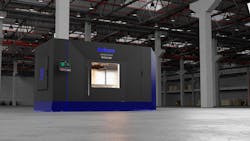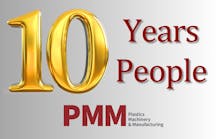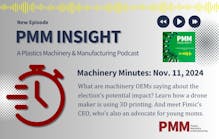Argo 1000 Hypermelt This large-format 3D printer from Roboze is designed for the manufacture of high-performance parts, such as turbine blades and custom automotive parts, in one piece, reducing the need for post-production assembly, as well as functional prototypes, tooling, molds and jigs. Materials in its repertoire include advanced composites and polymers, such as polyetheretherketone (PEEK) and Ultem 9085.
What’s new? The printer, the latest version of Roboze's large-scale 3D printer, now featuring the company’s Hypermelt technology, which allows it to process pellets. It features Roboze’s independent dual extruder, or IDEX, system, allowing it to operate with two independent extruders to produce multiple parts simultaneously, doubling productivity. The first printers are slated to be installed in customers’ plants this fall and winter.
Benefits Quick, efficient production of large, precise, consistent parts that need little post-processing. Because it can work with engineering-grade materials — even without additives — the printer produces parts that can withstand high loads, abrasion and thermal stresses. Parts exhibit good strength-to-weight ratios, resistance to high temperatures and excellent chemical resistance. The printer’s use of pellets represents a cost savings, compared with filament printers, and allows users to more easily incorporate recycled and biobased materials.
Roboze, Houston, 346-229-5675, www.roboze.com
Vital Statistics
|
Build volume |
About 3.3 feet by 3.3 feet by 3.3 feet |
|
Throughput |
Up to around 33.1 pounds per hour |
|
Temperature of heated chamber |
356 degrees Fahrenheit |
Karen Hanna | Senior Staff Reporter
Senior Staff Reporter Karen Hanna covers injection molding, molds and tooling, processors, workforce and other topics, and writes features including In Other Words and Problem Solved for Plastics Machinery & Manufacturing, Plastics Recycling and The Journal of Blow Molding. She has more than 15 years of experience in daily and magazine journalism.






